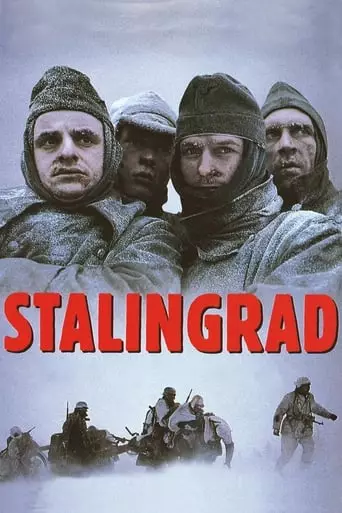“Stalingrad” follows the progress of a German Platoon through the brutal fighting of the Battle of Stalingrad. After having half their number wiped out and after being placed under the command of a sadistic Captain, the Lieutenant of the platoon leads his men to desert. The men of the platoon attempt to escape from the city which is now surrounded by the Soviet Army.
Stalingrad (1993), directed by Joseph Vilsmaier, takes a stark look at the brutal reality of war through the eyes of German soldiers during the infamous Battle of Stalingrad in 1942-1943. The film follows a group of German soldiers who are sent to capture Stalingrad, but soon find themselves trapped in a horrific siege as Soviet forces surround them. The film presents the internal disintegration of the soldiers, who go from a sense of duty and military pride to a more visceral and despairing understanding of their own mortality. Their idealism crumbles as they face the horrors of war: cold, starvation, and death. The narrative explores their psychological breakdowns, their moral dilemmas (such as the execution of civilians), and ultimately, the defeat of the German forces.
As the soldiers experience loss and witness the collapse of their comrades, they are left with stark choices: to fight on in the face of certain death, to desert, or to surrender. Ultimately, the film portrays the despair and futility of war as these men meet tragic ends, highlighting the toll war takes on the human spirit.
Themes of Stalingrad (1993)
The film explores several powerful themes:
- The Futility of War: As the soldiers are slowly crushed by the siege, the film emphasizes the futility of war and the inevitable destruction it brings. The battle for Stalingrad is portrayed not as a noble cause but as a senseless and horrific chapter in a wider conflict that leaves all participants with nothing but loss.
- Human Cost of War: Through the personal stories of the soldiers, the movie explores the mental, emotional, and physical toll of war. From their fear of death to their struggles with their own morality, the soldiers’ experiences illustrate how war destroys humanity.
- Survival and Despair: The central question of survival emerges as soldiers face the cold and starvation, while others must grapple with the morally challenging task of obeying orders that contradict their own humanity.
- Disillusionment: The men begin with a sense of pride and purpose but are progressively broken down by the harsh reality of their situation. Their transition from soldiers to mere survivors is a powerful commentary on how war strips away ideals.
10 Reasons to Watch Stalingrad (1993)
- Historical Accuracy: The film is widely praised for its realistic portrayal of the Battle of Stalingrad, showcasing the conditions the soldiers faced, from tank battles to trench warfare
- Human Element: Unlike many war films that focus on large-scale battle scenes, Stalingrad delves into the psychological and emotional journeys of individual soldiers, making it a deeply personal experience
- Intense Action: The brutal combat scenes, particularly the tank battles, are depicted with meticulous attention to detail. The ferocity of battle is palpable
- Cinematography: The film’s cinematography captures the stark contrast of the desolate Russian winter and the wreckage of war, contributing to the somber tone of the film
- Authenticity: The filmmakers worked hard to present accurate representations of German uniforms, weapons, and tactics, immersing viewers in the history of the battle
- Moral Dilemmas: The film presents ethical challenges faced by soldiers, like the execution of civilians, adding complexity to the characters’ development
- Emotional Depth: The deep emotional currents running through the film, such as grief, loss, and betrayal, add a layer of poignancy rarely seen in war films
- Challenging War Propaganda: The film doesn’t glorify war but instead criticizes the romanticized notions of military duty, offering a sobering perspective on conflict
- Cultural Insight: The portrayal of the German soldier’s perspective, rarely seen in such detail in Western war films, offers a unique viewpoint on WWII
- Unforgettable Impact: Stalingrad leaves a lasting emotional impact, forcing viewers to reflect on the nature of war and its destruction of human lives.
How You Might Feel After Watching Stalingrad (1993)
After watching Stalingrad, you may feel a deep sense of melancholy and a powerful appreciation for the human cost of war. The grim realities of war are laid bare, and the film does not offer any comfort or easy answers. Instead, it confronts you with the psychological and physical devastation experienced by the soldiers, leaving you with a somber understanding of the futility and tragedy of warfare. You may feel disillusioned and reflective, contemplating the lasting effects of war on both the individual and society. The film is not just about the battlefield; it’s about the emotional and psychological aftermath that stays with you long after the final credits roll
Stalingrad is not for those looking for a traditional war movie with glorified heroism but rather for those who seek a nuanced, emotional, and morally complex story about the consequences of war.

